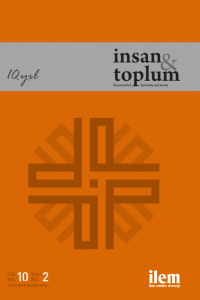Abstract
Doğal hukuk felsefesi ve doğal hukuk felsefesinin bir kolu olan İngiliz faydacı felsefesi temelinde zenginlik ve moral incelemesi olarak gelişen politik iktisat, marjinalist devrimle beraber iktisada dönüşmüştür. Marjinalist devrim; sınıf, kurum ve tarih kavramlarını incelemenin dışında tutarak doğa bilimlerindeki gibi bilimsel bir “kesinlik” hedeflemiştir. Bu dönüşüm, disipline, gevşek bir sosyal teori yerine olgun bilimsel bir teori görünümü vermiştir. Aynı zamanda bu dönüşüm, disiplinin liberal karakteriyle uyumludur. İlgili dönüşümle iktisat, bir yandan sosyal bilimler içerisinde en güçlü bilimsel forma kavuşmuş disiplin konumunu elde etmiş öte yandan da kendi sınırlarını daraltmıştır. Heterodoks iktisat okullarından kurumsal iktisat, disiplinin söz konusu dönüşümüne ciddi bir şekilde muhalefet etmektedir. Kurumsal iktisat hem analiz nesnesi olarak kapitalizmi seçerek hem de ilgili kapitalizme mesafeli ve eleştirel durarak formel iktisadın liberal karakterini sorgulamaktadır. Kurumsal iktisat, ekonomiyi kurumsallaşmış bir süreç olarak algılamaktadır. Piyasayı doğal değil verili kabul etmektedir. Ekonomi de piyasadan daha geniş bir alanı kapsamaktadır. Bu durumda kurumsal iktisada göre bilim olarak iktisadın tanımı genişleyecek ve değişecektir. İktisat, “bilimsel iktisadın” dar kalıplarından uzaklaşacak, yeniden politik iktisat niteliğine bürünecektir. Bu çalışmada, kurumsal iktisadın politik iktisat olarak kavranmasının çağdaş kapitalizmin değerlendirilmesinde ve ilgili kapitalizmin temel yönelimlerinin anlaşılmasında bir imkân teşkil ettiği iddia edilmektedir.
References
- Acemoğlu, D. ve Robinson, J. A. (2020). Dar koridor: Devletler, toplumlar ve özgürlüğün geleceği. Y. Taşkın (Çev.). İstanbul: Doğan.
- Acemoğlu, D. ve Robinson, J. A. (2014). Ulusların düşüşü. F. R. Velioğlu (Çev.). İstanbul: Doğan.
- Acemoğlu, D. ve Robinson, J. A. (2008). Persistence of power, elites, and institutions. American Economic Review, 98(1), 267-293.
Abstract
Political economy, which developed as a study of wealth and ethics on the basis of the natural law philosophy and the British utilitarian philosophy which is a branch of natural law philosophy, has turned into economics with the marginalist revolution. The marginalist revolution has aimed at scientific “certainity” as in natural sciences, by excluding the concepts of class, institutions and history. This transformation gave the discipline a mature scientific theory appearance instead of a loose social theory form. This transformation is also consistent with the liberal character of the discipline. With that transformation, economics, on one hand, gained the most powerful scientific form among social sciences and on the other hand, it narrowed its borders. Institutional economics, one of the schools of heterodox economics, is seriously opposed to the transformation of the discipline. Both by choosing capitalism as an analysis object and by staying apart from or critical towards this capitalism institutional economics judges the liberal nature of formal economics. Institutional economics considers the economy as an institutionalized process. It accepts the market as given not natural. Economics also covers a wider area than the market. In this case, according to institutional economics, the definition of economics as science will expand and change. Economics will move away from the narrow patterns of scientific economics and reappear as political economy. In this study, it is claimed that conceiving institutional economics as political economy constitutes an opportunity to evaluate contemporary capitalism and to understand the basic tendencies of the this capitalism.
References
- Acemoğlu, D. ve Robinson, J. A. (2020). Dar koridor: Devletler, toplumlar ve özgürlüğün geleceği. Y. Taşkın (Çev.). İstanbul: Doğan.
- Acemoğlu, D. ve Robinson, J. A. (2014). Ulusların düşüşü. F. R. Velioğlu (Çev.). İstanbul: Doğan.
- Acemoğlu, D. ve Robinson, J. A. (2008). Persistence of power, elites, and institutions. American Economic Review, 98(1), 267-293.
Details
| Primary Language | Turkish |
|---|---|
| Subjects | Economics, Sociology |
| Journal Section | Research Articles |
| Authors | |
| Publication Date | June 15, 2020 |
| Published in Issue | Year 2020 Volume: 10 Issue: 2 |


